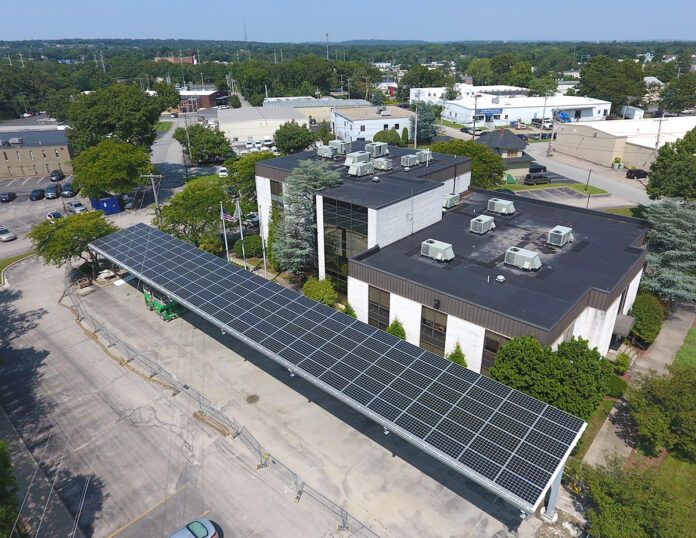
WARWICK – Rhode Island will soon begin offering an extra financial incentive to commercial solar developers who build their ground-mounted canopies over parking lots.
The R.I. Public Utilities Commission on Tuesday approved a 6-cent-per-kilowatt-hour incentive for solar carport projects, which will be paid on top of the fixed price paid for power generation.
For a solar carport producing 1.3 million kilowatt-hours per year, that would mean roughly $78,000 more annually, according to National Grid Rhode Island calculations.
As approved, the pilot project will last for one year and limit the incentive to up to 6 megawatts of carport projects in total. The parking lot area underneath the carport must be permanent.
These projects and the additional financial incentive will be included in the state’s Renewable Energy Growth Fund which under National Grid’s administration allows customers to sell their renewable energy output under long-term tariffs at fixed prices.
The R.I. Office of Energy Resources and Distributed Generation Board recommended the carport adder as a way to lure solar developers to build their projects on already developed land, rather than the open space and forestland where most projects have been located.
Several state environmental groups submitted letters of support for the proposal as part of their efforts to stop the clearcutting of trees that as occurred when solar developers build on forest and farm land.
The commission’s approval came through a series of motions to define these type of projects and set the payment rate, among other details. Commissioners Margaret Curran and Marion Gold voted in favor of all components of the carport proposal, while Commissioner Abigail Anthony opposed or abstained from the votes.
Referring to discussion in a public hearing earlier this month, Anthony said she found the lack of qualitative cost-benefit analysis on how the proposal would make carport projects more affordable and dissuade developers from taking over open land to be “disqualifying.” She said she needed to remain consistent with the memo she issued last year, when the PUC denied a similar proposal for carports.
Commissioners Curran and Moran also expressed concerns with the lack of data on the project outcomes, but emphasized that a pilot project will allow the state to gather more information on its potential success. As part of their approval, the commission requires the state to report back on findings from the program in 2021.
“To the extent state is serious about protecting open lands and protecting forest land, it seems that it would be most helpful to include …something that makes it deleterious to develop on undeveloped land,” Curran said.
The commission also unanimously approved a motion that outlines how the DG Board should proceed with any proposed policy adders next year, including requirements for more qualitative and quantitative analysis.
Nancy Lavin is a PBN staff writer. You may reach her at Lavin@PBN.com. Follower her on Twitter at @NancyKLavin.












